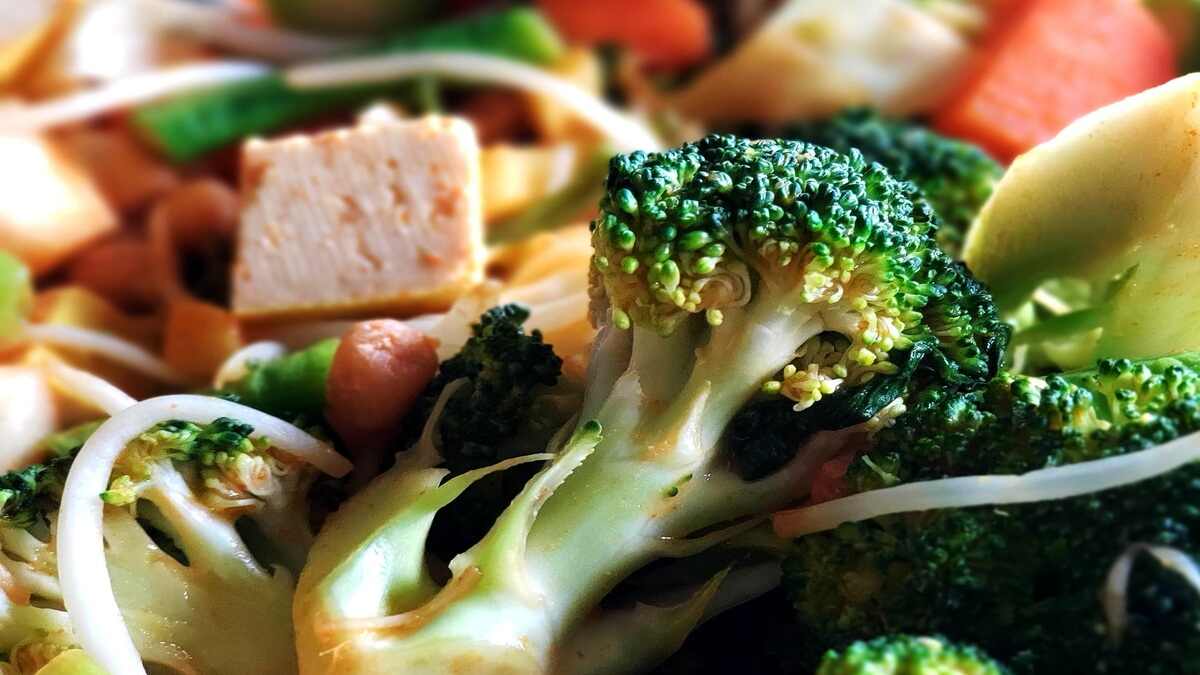Introduction
Imagine a sizzling pan brimming with crisp broccoli, glossy bell peppers, and tender snap peas, all tossed in a glossy garlic-ginger sauce.Vegetable Stir-Fry Recipe isn’t just a meal—it’s a 15-minute miracle that transforms humble veggies into a crave-worthy feast. Originating from ancient Chinese kitchens, this technique has conquered global palates thanks to its speed, versatility, and nutritional punch. Whether you’re a kitchen newbie or a seasoned chef, this guide will help you create stir-fry magic every time. Let’s fire up that work!
What Is Vegetable Stir-Fry Recipe?
Vegetable Stir-Fry Recipe is a cooking method where bite-sized veggies are quickly cooked over high heat in a small amount of oil, often paired with a savory sauce. The goal? To retain their crunch, color, and nutrients while absorbing bold flavors like soy, ginger, or sesame. Unlike slow-cooked dishes, stir-frying locks in freshness, making it ideal for time-crunched cooks and health-conscious eaters.
A Wok Through History:The Origin of Stir-Frying Vegetable Stir-Fry Recipe
Stir-frying dates back over 1,500 years to China’s Han Dynasty, where resourceful cooks used round-bottomed woks over open flames to conserve fuel and cook food rapidly. The term “chǎo”means “to stir and fry,” reflecting the technique’s dynamic process. With the 20th-century rise of Chinese immigration, stir-frying spread globally, adapting to local ingredients—think Thai basil, Japanese teriyaki, or American broccoli. Today, it’s a universal symbol of fast, fresh, and flavorful cooking.

Ingredients: Building Your Vegetable Stir-Fry Recipe Masterpiece
Flexibility is key! Mix and match based on what’s in your fridge:
- Vegetables: 4–5 cups total (e.g., bell peppers, broccoli, carrots, snap peas, mushrooms, baby corn).
- Aromatics: Garlic (3 cloves), ginger (1-inch knob), scallions.
- Sauce: ¼ cup soy sauce, 2 tbsp oyster sauce (or hoisin for vegan), 1 tbsp rice vinegar, 1 tsp sesame oil, 1 tsp cornstarch (to thicken).
- Protein (Optional): Tofu, tempeh, or thinly sliced chicken.
- Oil: 2 tbsp neutral oil (peanut, avocado) for high-heat cooking.
Pro Tip: Cut veggies uniformly for even cooking—no one wants mushy zucchini next to crunchy carrots!
Essential Equipment
- Wok or Skillet: A carbon-steel wok distributes heat best, but any large pan works.
- Sharp Knife: For precise chopping.
- Wooden Spoon or Spatula: To keep ingredients moving.
- Small Bowl: For mixing sauces.
Step-by-Step Preparation
- Prep Everything First: Vegetable Stir-Fry Recipe is fast—chop veggies, mix sauce, and mince aromatics beforehand.
- Heat the Wok: Add oil and swirl to coat. Wait until it shimmers (about 1–2 minutes on high heat).
- Cook Aromatics: Add garlic, ginger, and scallions. Stir 30 seconds until fragrant.
- Add Veggies: Start with hard veggies (carrots, broccoli) and cook 2–3 minutes. Toss in softer ones (mushrooms, bok choy) last.
- Pour in Sauce: Drizzle sauce over veggies, stirring constantly. Let it thicken (1–2 minutes).
- Finish: Remove from heat. Top with sesame seeds or chili flakes.
Pro Tip: Don’t overcrowd the pan—cook in batches if needed to avoid steaming.
Health Benefits: Why Stir-Fry Is a Nutritional Powerhouse
- Low-Calorie, High-Volume: A 2-cup serving averages 150–200 kcal but keeps you full with fiber (5–7g per serving).
- Vitamin Boost: Bell peppers (vitamin C), carrots (vitamin A), and leafy greens (iron) pack a micronutrient punch.
- Heart-Healthy: Using minimal oil and swapping in tofu reduces saturated fat.
- Customizable: Easily adapt for keto (skip cornstarch), gluten-free (tamari instead of soy), or vegan diets.
Expert Insight: A 2019 Journal of Nutrition study found that stir-frying preserves antioxidants better than boiling or steaming.
Serving Suggestions & Pairings Vegetable Stir-Fry Recipe
- Classic Combo: Serve over jasmine rice, quinoa, or noodles.
- Add Crunch: Top with crushed peanuts or crispy shallots.
- Drink Pairing: Green tea or a citrusy Sauvignon Blanc.
- Leftover Magic: Stuff into lettuce wraps or omelets.
Nutritional Snapshot (Per Serving)
| Calories | Prep Time | Cook Time | Servings |
| 180 kcal | 15 mins | 10 mins | 4 |

Note: Values vary based on veggies and sauce used.
FAQs
Q: How do I prevent soggy veggies?
A: Pat veggies dry before cooking, use high heat, and avoid overcrowding the pan.
Q: Can I use frozen vegetables?
A: Yes! Thaw and drain them well to remove excess moisture.
Q: What’s the best substitute for oyster sauce?
A: Hoisin sauce (for sweetness) or soy sauce + a pinch of sugar.
Unique Twists: Global Flavors
- Thai-Inspired: Add coconut milk, red curry paste, and basil.
- Korean Style: Toss with gochujang (chili paste) and kimchi.
- Mediterranean: Use olive oil, olives, lemon, and oregano.
Conclusion
Vegetable Stir-Fry Recipe is the ultimate kitchen ally—quick, nutritious, and endlessly adaptable. Whether you’re clearing out the fridge or craving a veggie-loaded meal, this dish proves healthy eating doesn’t have to be bland or time-consuming. With a hot pan, fresh ingredients, and a dash of creativity, you’ll turn simple veggies into a symphony of flavors. So grab your wok, channel your inner chef, and stir up something spectacular!
